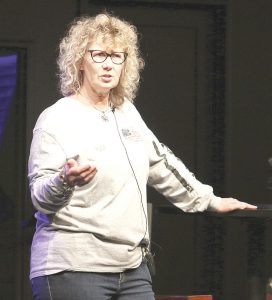
Karla Wagner, founder of the AxMITax proposal, speaks at Lifesong Church in Snover on Tuesday, Feb. 20. Photo by Casey Johnson
“What would your life look like without property taxes?”
The question was posed by Karla Wagner, founder of the grassroots AxMITax proposal, an initiative that has launched a statewide petition drive to end property taxes in Michigan.
Wagner spoke last week at Life Song Church, Snover, at the invitation of We the County.
Wagner is from Cannon Township in Kent County. Kent County is on the west side of Michigan, and encompasses the City of Grand Rapids. She is a real estate agent, a small business owner, and licensed builder.
Advocates of the movement believe life would look much better, with more businesses and homeowners building a life in Michigan.
Critics say the outlook would be bleak without property taxes to support emergency services, schools, libraries, roads, and more.
A couple dozen Sanilac County residents listened to Wagner as she explained the proposal, her own research into government spending, and reasons why she believes ending property taxes would help Michiganders by keeping people in their homes, on their farms, and in business.
Supporters of the AxMITax movement are collecting signatures in hopes of placing a proposed amendment to Article IX of the state constitution on the November 2024 ballot. If passed, the amendment would eliminate Michigan’s current property tax system. The group needs 446,198 valid signatures to be successful.
“We have to maintain private property ownership,” Wagner said at the Feb. 20 meeting, encouraging those in attendance to vote no on all upcoming millages, including for emergency services.
Wagner told the audience that she is not against schools, libraries, or emergency services – but she believes there is a different way to pay for those services other than money from property owners who may not use them.
“Show me the book in the library that is worth losing your home over,” Wagner said, She said she would rather pay an annual $100 or “whatever the fee” to use the library, rather than be forced to pay property taxes because others – who may not pay property taxes – voted yes on a millage.
Wagner gave examples of state spending on education, and cited numbers from her own business and residential property tax bills.
Wagner said the Kent County library is funded with millages from three townships and receives more than $1 million in property taxes. Kent County also has a museum and zoo millage.
Wagner said she does not believe libraries, schools, emergency services or organizations and services would fail financially if there were no property taxes. State, county, and municipal hands would just be forced to find revenue elsewhere.
A condition of the amendment is an increase in the general revenue sharing percentage of state sales tax that is distributed annually to cities, villages, and municipalities. The amendment also attests that counties would receive a portion of that revenue.
The outcome of eliminating property taxes, however, would still vary by county.
“There are a few things voters should understand when deciding whether to support the AxMITax proposal,” said Jon Block, chairman for the Sanilac County Board of Commissioners, in an email to the News. “Property tax is the largest and most consistent source of revenue for local government. Even though the AxMITax proposal would increase state revenue sharing with local government, state funding would be substantially less compared to what is generated today.”
Block addressed what this could mean for Sanilac County.
“The AxMITax proposal would also eliminate all millages levied by voters in Sanilac County,” Block said, adding, “The elimination of any of the millages will effectively end the service tied to the millage. Currently, Sanilac County has voter approved millages supporting many public services including veterans, emergency services, and road improvements. I want to be clear that this proposal would impact 911 and emergency services as well”
Block continued: “Without property tax, counties, school districts, townships, and cities/ villages will only be able to collect revenue from the state. This will remove the ability for county voters to decide what they do, or do not, want to raise funds for. AxMITax would put the state in control of funding local units of government and the services they provide. This is effectively a large step backwards from local control of emergency, school, and other local governmental services. ”
Block addressed the differences between counties such as Sanilac and Kent.
“The AxMITax proposal will also disproportionately affect rural Michigan due to the replacement of revenue being contingent on population,” he said. “Sanilac County is a large county in physical size but with a small population, so regardless of our needs we will receive revenue based on population with no avenue to raise local funds independently.”
Block continued: “For example, Kent County – where the AxMITax proposal originated, has a population of 659,166. Sanilac County has a population of 40,611, so we can clearly see the vast majority (of state funding) will not come to the aid of Sanilac County residents.”
The proposal does not mandate state funding for services such as libraries and museums.
For libraries, Wagner suggested charging a fee.
Sanilac County librarians in Sandusky and Croswell disagree with this approach.
“Our budget is a miniscule fraction of the Kent County library,” Nicole Markel and Jessica Rivett, co-directors of Sandusky District Library, stated in an email to the News. “Although we are working with a budget scaled to reflect our rural area, we strive to provide needed services to all members of our community.”
Last year, Markel and Rivett said, millage funding accounted for 85.32 percent of the library’s total revenue.
“This money goes towards providing materials like books (both physical and digital), staff support, printing/copying services, programs, local history archiving, and building maintenance,” they stated. “We are passionate about keeping the library free for everyone in our community. We believe it is an important place where everyone can learn, connect, and engage with one another.”
Marty Rheaume, library director for Aitkin Memorial Library in Croswell, said libraries in the county would be “devastated” if property taxes were eliminated.
“Eighty-three percent of our budget comes from millages. That’s $250,000 of our $300,000 (annual) budget.”
Rheaume continued: “Residents would see a drastic reduction in hours and staff, a limited number of new books, and a decrease in the quality of our technological resources, and an elimination of professional quality programming.”
As for charging a fee, Rheaume said that would turn public libraries into “private book clubs.”
“The whole purpose of the library is that it’s open and available to everyone in the community,” he said. “A fee structure would be an insurmountable obstacle to the people who need it the most, and a significant deterrent to everyone else.”
Rheaume said he couldn’t speculate on the amount they would have to charge each individual to maintain the library budget, because that would “fundamentally alter the role and nature of libraries.”
“If people want to defund public libraries,” he said, “that’s their prerogative. But they should have the guts and integrity to tell people that’s what they want to do.”
Wagner also suggested school, road, and emergency funding could come from other sources of state revenue like state income tax, corporate business tax, real estate transfer tax, alcohol, marijuana and tobacco taxes, and the lottery. Local millages, if needed, could be funded by community members – not tax payers exclusively.
While she said she believes police, fire, and emergency services to be essential, Wagner said the way to get government attention is to speak the “only language they know” – money. “For now,” she encouraged the crowd to vote no on emergency service millages.
In Sanilac County, several municipalities have passed and rely on millages for these services, often with the goal that they won’t have to allocate funding from other county, city, village, or township services.
“The only way to replace that revenue would be from the state somewhere, through increased taxes or fees somewhere else,” said Tracy Hoff, village supervisor and fire chief for Deckerville. “So, you are going to pay for it somewhere.”
Property taxes for the village of Deckerville account for 27 percent ($39,300) of the funding in the fire department budget, according to Hoff.
The fire department also gets 16.7 percent ($39,000) of all the property taxes collected in the village. The total village revenue from property taxes, Hoff said, is $235,675.
Many local townships also levy millages to pay for fire coverage.
“There are fire millages in many townships that fund the coverage by their nearest fire department,” Hoff said. “If they were voted down, that money has to come from somewhere else in the operating budget, which forces them to cut some other service.”
At the meeting, Wagner also expressed her concerns about home, farm, and land loss due to property taxes, saying that “402 farms and over 100,000 acres of farm land were lost last year.”
Taking away property taxes, she said, would give business owners the opportunity to hire more people, and give aspiring home owners the opportunity to purchase property.
Continuing to raise property taxes is “creating a homeless problem we will never be able to fix,” Wagner said. “They (the government) will always find a way to replace the revenue. Once we lose our homes, we’ll never get them back. This is about saving your home, saving your farm, saving your business.”
As for homelessness due to property tax increases in Sanilac County, Block addressed some specific local exemptions.
“There are exemptions available to disabled veterans and those considered in poverty,” Block said. “Exemptions would be provided to those residents who qualify.”
Ultimately, Block said, the final decision will be up to voters.
“The AxMITax proposal will decimate local spending on emergency services, schools and roads,” he said. “Whether that is a good or bad idea is in the hands of the voters.”
Petition language
Constitutional Amendment to: prohibit state, county or municipal property taxes; require 60% of voters to approve local taxes; require a 2/3 vote of both State House and Senate to increase any state tax to raise revenue by more than 0.1% over 5 years; increase local governments from 15% for municipalities only to 20% for municipalities and 10% for counties; require that municipalities and counties each receive 10% of tax revenue from income, marihuana, alcohol, and tobacco; require that tax revenue distributed to municipalities and counties be used only to fund essential government infrastructure services; require legislation implementing these requirements.







